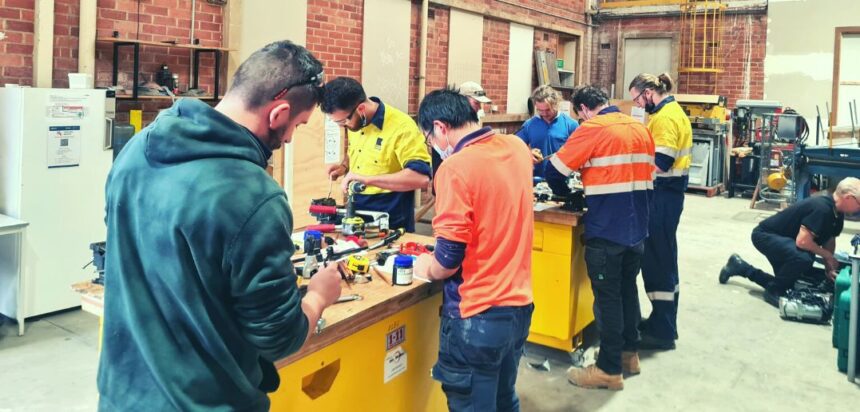A Certificate II in Air Conditioning serves as a gateway for anyone aspiring to join the HVAC industry.
As the demand for skilled HVAC technicians continues to grow, pursuing Certificate II training becomes an even more enticing prospect. In this article, we will explore the key reasons why studying a Certificate II in Air Conditioning could be a rewarding choice for your career aspirations. We'll discuss how you can gain your qualification, what it allows you to do and whether it's the right program for you.
What is a Certificate II in Split Air Conditioning?
The Certificate II in Air Conditioning and Heat Pump Split Systems (UEE20120) is a qualification that provides the skills and knowledge required to install, service and maintain split air conditioning systems. This type of certificate program is usually offered by vocational education and training (VET) institutions such as TAFE or an RTO.
Here are some key aspects that are typically covered in such a certificate program:
Installation Techniques – Students learn how to install split air conditioning systems according to manufacturer specifications and industry standards. This includes understanding the system components, cooling cycle and electrical connections. Safety Practices – Emphasis is placed on safety protocols, including safe handling of refrigerants, use of personal protective equipment and adherence to occupational health and safety guidelines. Technical Knowledge – Participants gain a fundamental understanding of thermodynamics, electrical principles and system components to effectively diagnose and repair problems with split air conditioning systems. Regulatory compliance – The certificate program may include guidance on relevant industry regulations, standards and codes of practice relating to the installation and maintenance of air conditioning systems. Practical skills – Practical training is a critical component of the programme, allowing students to develop practical skills through simulated exercises, workshops and real projects.
Upon successful completion of the Certificate II in Split Air Conditioning and Heat Pump Systems, graduates can pursue a variety of career opportunities in the heating, ventilation and air conditioning (HVAC) industry.
This qualification can serve as a pathway to further study or specialization in the field, allowing individuals to enhance their expertise and credentials in specific areas of air conditioning and refrigeration technology.
Who needs a Certificate II in Air Conditioning?
Certificate II in Split Air Conditioning and Heat Pump systems is an essential qualification. It is designed for professionals who may need to install split-system air conditioners as part of their normal duties, but who are not trained as HVAC technicians.
In most cases, Certificate II training is undertaken by electricians who want to broaden their skill set. Obtaining Certificate II allows you to install split-system air conditioners, which is a great way to expand your customer base and service offering.
Alternatively, you can choose to study a Certificate II in Air Conditioning as a pathway to becoming a fully qualified HVAC technician. Licensed technicians are required to undertake Certificate III training (which may require an apprenticeship). The skills you learn during your Certificate II training can be applied to the Certificate III program and can significantly shorten the time it takes to obtain a Certificate III certificate.
What can you do with a certificate II in air conditioning?
A Certificate II in air conditioning only allows you to install, commission and decommission the split air conditioning system (up to 18 kW). Certificate II training does not allow you to:
Complete electrical work required when installing air conditioning Install ducted air conditioning systems Install multi-head air conditioning systems Break down system Diagnose faulty air conditioning systems Service or repair air conditioning systems
The electrical work required for the installation and commissioning of an air conditioner must be carried out by a qualified electrician. Because of this, Certificate II training is most popular with electricians looking to expand their personal skill set and simplify the split air conditioning installation process for their customers.
If you need to install ducted air conditioners or if you want to offer air conditioning repair and maintenance services, you will need to complete a Certificate III in air conditioning.
How to earn a certificate II in air conditioning
Obtaining a Certificate II in air conditioning usually involves completing a structured training program offered by a TAFE, RTO or other VET provider. Here's a general step-by-step guide on how to earn this qualification:
Choose an accredited program – Start by researching institutions or training providers that offer Certificate II courses in air conditioning. Make sure the program is accredited by the relevant government body (Australian Refrigeration Council). Enroll in the program – Once you've selected the right training provider, enroll in the course. Attend training – Actively participate in your assignments by attending lectures, workshops and hands-on training sessions as required. If you study a Certificate II while working, your employer may pay for the training. They will only pay for training if you actively attend classes as required. Comprehensive assessments – Throughout the course, you will be assessed through a combination of written exams, practical assessments and project work. Participate in hands-on training – Get hands-on experience working with air conditioning systems. Practice your skills under the guidance of qualified instructors, learning how to install various types of air conditioning equipment. Complete Competency Modules – Successfully complete all required modules to demonstrate your competency on the Certificate II course. This may include passing practical assessments, written exams and other competency-based assessments. Certificate Is Issued – Upon successful completion of the Certificate II in air conditioning program, you will be awarded your degree. This certificate serves as an official recognition of your skills and can enhance your employment prospects in the HVAC industry. Possible specializations – Depending on your career goals and interests, you may choose to pursue a specialization (such as commercial HVAC) or further study (such as Certificate III training). Additional study can significantly improve your skills and career prospects.
By following these steps and actively participating in your training program, you can earn a Certificate II in Air Conditioning and develop the skills needed to succeed in this specialized field.



